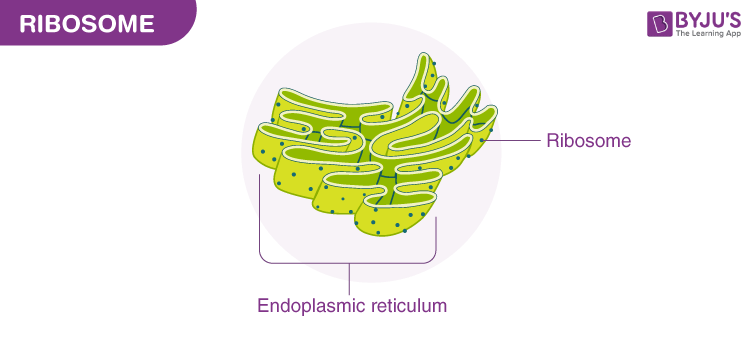Table of Contents
Ribosomes Definition
“Ribosomes are one of the most important cell organelles composed of RNA and protein that converts genetic code into chains of amino acids.”

What are Ribosomes?
A ribosome is a complex molecular machine found inside the living cells that produce proteins from amino acids during a process called protein synthesis or translation. The process of protein synthesis is a primary function, which is performed by all living cells.
Ribosomes are specialized cell organelles and are found in both prokaryotic and eukaryotic cells. Every living cell requires ribosomes for the production of proteins.
This cell organelle also functions by binding to a messenger ribonucleic acid (mRNA) and decoding the information carried by the nucleotide sequence of the mRNA. They transfer RNAs (tRNAs) comprising amino acids and enter into the ribosome at the acceptor site. Once it gets bound up, it adds amino acid to the growing protein chain on tRNA.
Also Read: Cell Organelles
Ribosomes Structure

A ribosome is a complex of RNA and protein and is, therefore, known as a ribonucleoprotein. It is composed of two subunits – smaller and larger.
The smaller subunit is where the mRNA binds and is decoded, and in the larger subunit, the amino acids get added. Both of the subunits contain both protein and ribonucleic acid components.
The two subunits are joined to each other by interactions between the rRNAs in one subunit and proteins in the other subunit.
Ribosomes are located inside the cytosol found in the plant cell and animal cells.
The ribosome structure includes the following:
- It is located in two areas of cytoplasm.
- Scattered in the cytoplasm.
- Prokaryotes have 70S ribosomes while eukaryotes have 80S ribosomes.
- Around 62% of ribosomes are comprised of RNA, while the rest is proteins.
- The structure of free and bound ribosomes is similar and is associated with protein synthesis.
Ribosomes Function
The important ribosome function includes:
- It assembles amino acids to form proteins that are essential to carry out cellular functions.
- The DNA produces mRNA by the process of DNA transcription.
- The mRNA is synthesized in the nucleus and transported to the cytoplasm for the process of protein synthesis.
- The ribosomal subunits in the cytoplasm are bound around mRNA polymers. The tRNA then synthesizes proteins.
- Ribosomes are the site of protein synthesis.
- The proteins synthesized in the cytoplasm are utilized in the cytoplasm itself, the proteins synthesized by bound ribosomes are transported outside the cell.
Also Read: Cells
For more information on ribosomes structure and function, keep visiting BYJU’S website or download the BYJU’S app.
Frequently Asked Questions
What is the function of the ribosome?
Ribosomes are the organelles that help in protein synthesis. Protein is required for many cell activities such as damage repair and other chemical processes.
What is a ribosome composed of?
A ribosome is composed of two subunits:
- the small ribosomal subunits, which read the mRNA
- the large ribosomal subunits, which form polypeptide chains of amino acids.
How does the ribosome work?
The ribosomal subunits come together and combine with the mRNA during protein synthesis. They bind to the mRNA and start the synthesis of proteins.
What are the two different types of ribosomes?
The two different types of ribosomes include:
- 70 S-found in prokaryotic cells
- 80 S-found in eukaryotic cells
How are prokaryotic ribosomes different from eukaryotic ribosomes?
Prokaryotic ribosomes include three individual rRNA molecules and contain the large ribosomal subunit, the 80s.
Eukaryotic ribosomes include four individual rRNA molecules and contain the small ribosomal subunit, the 70s.
Further Reading:

Extremely good explanation!
Thank you so much Byju’s
Very nice Website
Thanks
Very good information:)))
Very informative